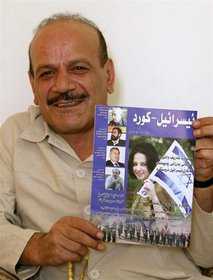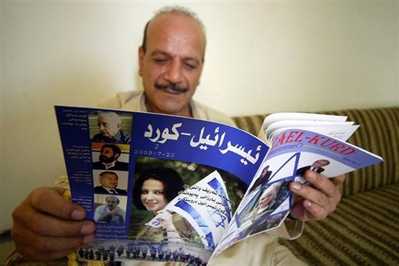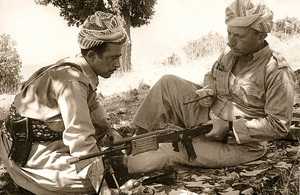Expert Mechanism on the Rights of Indigenous Peoples
Council of Human Rights
2nd Session / 10th – 14th August 2009
Switzerland – Geneva
Agenda Item 3: Lessons learned and challenges to implementing indigenous people’s right to education.
Date: 04 August, 2009
No: Sta.19-H0409
Title: Obstacles preventing the use of mother tongue in Iraqi Turkmen education
Iraq is well-known for its multiethnic multi-religious population; Arabs, Kurds, Turkmen, Chaldea-Assyrians, Yazidis, Shabaks and Mandaeans comprise the rich cultural mosaic that is the Iraqi population.
The Turkmen represent the third largest ethnic group in Iraq after the Arabs and Kurds. Unfortunately, they are constantly marginalized and their population size has always been underrepresented for economical and political reasons.
Iraqi Turkmen live mainly in a region that stretches over a thousand kilometers from Telafer in the Northwest to Badra and al-Aziziyya in the al-Kut province in mid eastern Iraq. They populate the following provinces: Kerkuk, Mosul, Erbil, Salah al-Ddin, Diyala, Kut and Baghdad.
Although the federal constitution of Iraq guarantees the rights of all Iraqis to educate their children in their mother tongue in accordance with educational guidelines, or in any other language in private educational institutions, [1] these obligations have yet to see full implementation.
The Government of Iraq does not fully guarantee its obligations to recognize and guarantee rights under the international treaties that it has signed reflecting those principles (the right to accessible education, the need for cultural adaptation of education, and the right of indigenous peoples to establish and control their educational systems).
The Turkmen of Iraq have been denied education taught in their native language, since the establishment of the Iraqi state in 1921. In Erbil city, education in Turkmen was financed by the Iraqi Turkmen Front (ITF) until 2005, when all possessions of the Turkmen political institutions were confiscated by Kurdish authorities. In other provinces Turkmen schools are founded by the local governmental education offices and the Iraqi Turkmen Front. These schools are still predominantly financed by the Iraqi Turkmen Front, a non-profit political organization. The total number of Turkmen schools exceeds 500 and is operative in most of Turkmen regions.
The political instability and state of insecurity after the 2003 occupation has exposed the indigenous peoples to brutal human rights violations; intimidations, marginalization and distortion of demography of their regions. [2-4] The right to provide education in the Turkmen native language meets many obstacles, as the revised Iraqi constitution promotes protection of such rights but vaguely formulate the terminology, which constitutes an important impediment. After occupation, the general political atmosphere adopted a new religious and ethnic strategy which inevitably influenced the constitution writing committee. Kurdish attempts to emphasize their ethnic role within Iraq can be considered the dominant factor that contributed to discrimination outlined in article 4 of the constitution. Article 4 differentiates Arabs and Kurds from other indigenous Iraqis. [1]
Article 4, first, The Arabic language and the Kurdish language are the two official languages of Iraq. The right of Iraqis to educate their children in their mother tongue, such as Turkmen, Syriac, and Armenian shall be guaranteed in government educational institutions in accordance with educational guidelines, or in any other language in private educational institutions.
Article 4, Item 4 ambiguously refers to a notion which further complicates the use of mother tongue by the Indigenous peoples. It demands a population density to establish a language official in a region. This necessitates another authority to approve if a community has a population density in a region. In present nationalist atmosphere of the Iraq politics, making a decision in favor of the vulnerable Indigenous communities is not easy. Worth noting that the Iraqi Parliament endorsed Iraq’s obligation to the League of Nations in 1932 that Turkmen, in addition to other languages would be officially recognized in several Turkmen regions, such as Kerkuk, Kifri and Erbil. [5]
Article 4, fourth: The Turkmen language and the Syriac language are two other official languages in the administrative units in which they constitute density of population.
The Kurdish authorities claim vast Turkmen regions, where they dominate the administration in most of these regions. Relaying on ambiguous terminology in the constitution, the Kurdish authorities prevent the Turkmen language to be officially recognized. This hampers use of mother tongue in education. In the case of Kerkuk, despite the fact that this province is well known for its Turkmen nature, [6 & 7] the decision making Kurdish authorities refused to use Turkmen as an official language.[8] It took four years until the federal court approved Turkmen as an official language in Kerkuk, but still the application of the law is limited.
Turkmen schools and the critical difficulties
It was a huge mission to start education in Turkmen (Turkish) native language for such a large community. Millions of Turkmen spread hundreds of kilometers wide, require expert staff and governmental offices, professional teaching, and a plethora of resources most of which are denied due to administrative and financial restraints.
The two main factors deteriorate Turkmen education come from political conflicts and the Iraqi Ministry of Education’s refusal to make funds available. Large numbers of schools in Turkmen regions are still not able to use their mother tongue or it offer only one lesson in Turkmen language. The number of schools that provide all lessons in Turkmen is extremely small.
The difficulties of Turkmen education can be divided into three categories:
1. Schools in Kurdish Region
Erbil city and Kifri district are two historical Turkmen regions under the authority of Kurdish administration. Although Turkmen constituted more than half of the population in both these regions in the first half of 20th century, after continuous Kurdish migration, the percentage of Turkmen has now decreased to 1/3 of the Erbil population and 20% of Kifri city.
Turkmen schools in the Kurdish region were established in the mid 1990s by the Iraqi Turkmen Front. There are 15 Turkmen schools in Erbil city, 2 Kindergarten, 9 primary schools, 2 intermediate and 2 secondary. In Kifri there is one primary and one secondary school. All lessons are taught in Turkmen in these Kifri schools.
In 2005, the Kurdish authorities seized all of these schools along with 12 other factions of the Iraqi Turkmen Front, including a print house, a newspaper and local television and radio stations. The print house was closed since that time which increased the shortage of books in Turkmen schools.
The major difficulties facing these schools:
• These schools are administered by non-expert Kurdish staff who are not qualified in Turkmen language and/or Turkmen culture
• The school curricular is devised by Kurdish specialists
• Kurdish language is imposed on students from the first year of primary school
• Mainly, Kurdish history is studied
• The Syllabus is monitored by Kurdish supervisors
• Kurdish directors are appointed to these schools
• The content of the curricular, the explanatory drawings, and the activities are all reflect the Kurdish heritage and culture instead of Turkmen.
The Turkmen education have been deliberately neglected by Kurdish authorities, consequently, registration of new students is currently significantly decreased and about to be terminated.
2. Schools under central government
This region includes immense Turkmen districts in Mosul, Kerkuk, Salah al-Din, Diyala and Kut provinces. The schools in these regions are divided between two types:-
A. Schools which lecture in Turkmen language, and
B. Schools which lecture in Arabic, and provide one lesson in Turkmen language and literature.
The latter type of school exists in Kerkuk province, Erbil and Kifri city.
The major difficulties within these schools are that a large percentage of teachers and all school materials are not paid by the Iraqi ministry of education.
3. Shared difficulties by schools under both authorities:
• Absence of Turkmen education directorate in the Iraqi ministry for education and in the Education directorates of provinces, except Kerkuk province.
• The absence of cultural institutions. Consequently, there are no official authorities which publish books related to Turkmen.
• Insufficiency of teaching staff and facilities
• Shortage of experts and supervisors of Turkmen language and literature
• Many schools are old and needs renovation.
• Shortage of materials and resources: including books, science equipment, computer and internet facilities, photocopying facilities, temperature regulating systems
o For example, there are 148 schools in Telafer districts which study only Turkmen language and literature. The ministry of education doesn’t pay for 28 teachers. The shortage in the number of teachers is 35. In 2008, the students had received only 4000 school books from 35.000.
Turkmen education still could not be introduced into the large Turkmen communities in Diyala and Kut provinces, location of important and large Turkmen districts. These regions have been exposed to Arabic and Kurdish immigration for a long time. Aggressive assimilation policies have been practiced against Turkmen in these regions.
Demands:
The Declaration requires that “States, in consultation and cooperation with indigenous peoples, shall take the appropriate measures, including legislative measures, to achieve the outcome of this Declaration” (art. 38). This general mandate is further elaborated on in other provisions, with specific affirmative measures required from States in connection with almost all the rights affirmed in the Declaration.
1. The directorate of Turkmen education, without which Turkmen studies are impossible to organize, should be established in the Iraqi ministry for education and in the province’s directorate for education.
2. The Kurdish authorities should abandon their assimilation policies against Turkmen and return the Iraqi Turkmen Front buildings which were confiscated in 2005; particularly, the schools, Turkmeneli newspaper, and print house should be retuned to the Iraqi Turkmen Front.
3. The Expert Mechanism on the Rights of Indigenous Peoples created pursuant to UN Human Rights Council Resolution 6/36 of December 14, 2007, has the mandate to “provide the Human Rights Council with thematic expertise on the rights of indigenous peoples […]”. In September 2008, the Expert Mechanism was given the more specific mandate of preparing a study on the lessons learned and challenges to achieve the implementation of the right of indigenous peoples to education. To that end, the Expert Mechanism was to request submissions from indigenous peoples’ organizations and civil society organizations (Human Rights Council Resolution 9/7). As part of this process the Iraqi Turkmen Human Rights Research Foundation (SOITM) presents this submission.
———————
1 Article 4 of the Iraqi federal constitution
2 Press Release of SOITM Foundation, “To the international community: The Iraqi people are in severe need of your help”, 13 July 2008, http://turkmen.nl./1A_soitm/PR.20-G1308a.doc
3 SOITM Foundation, “Kurdish authorities and Iraqi Indigenous populations: the suppression of Iraqi Yazidis”, 27 October 2008, http://turkmen.nl./1A_soitm/Rep.29-J2708.doc
4 SOITM Foundation, “Summary Violation of the human rights of the Iraqi Turkmen since the Establishment of the Iraqi State”, January 27, 2007, http://www.turkmen.nl/1A_soitm/Rep.9-A2707.doc
5 Arshad al-Hirmizi, “The Turkmen Reality in Iraq”, Publication of Kerkuk Foundation 2005, P. 16 http://www.turkmen.nl/1A_Others/EH2_english.pdf
6 David McDowall, “A Modern History of the Kurds”, (I.B.Tauris & Co Ltd Publishers, London & New York 1996), Page 329) and
7 Hanna Batatu, “The old social classes and the Revolutionary Movements of Iraq”, (Princeton University Press, New Jersey 1978), p. 913
8 Iraqi Federal Court, Decision number 15/federal/2008 which was made on demand of Kerkuk province council, at 21/4/2008,











